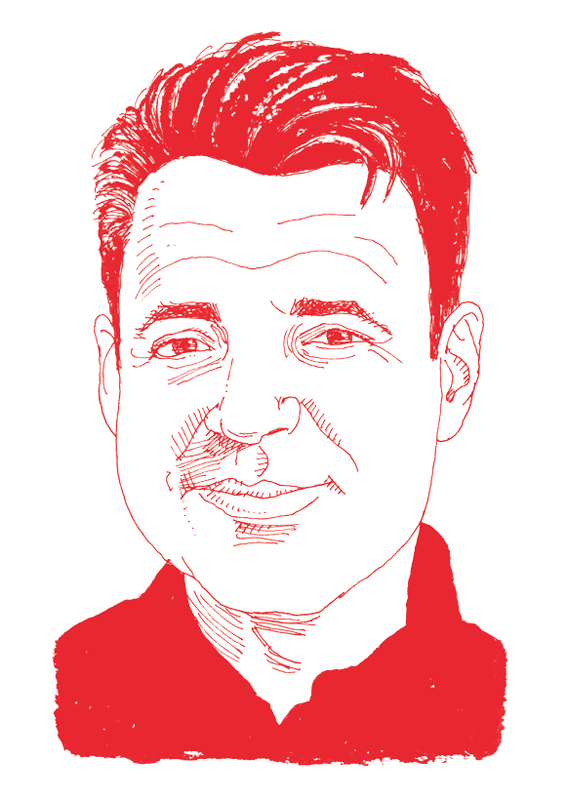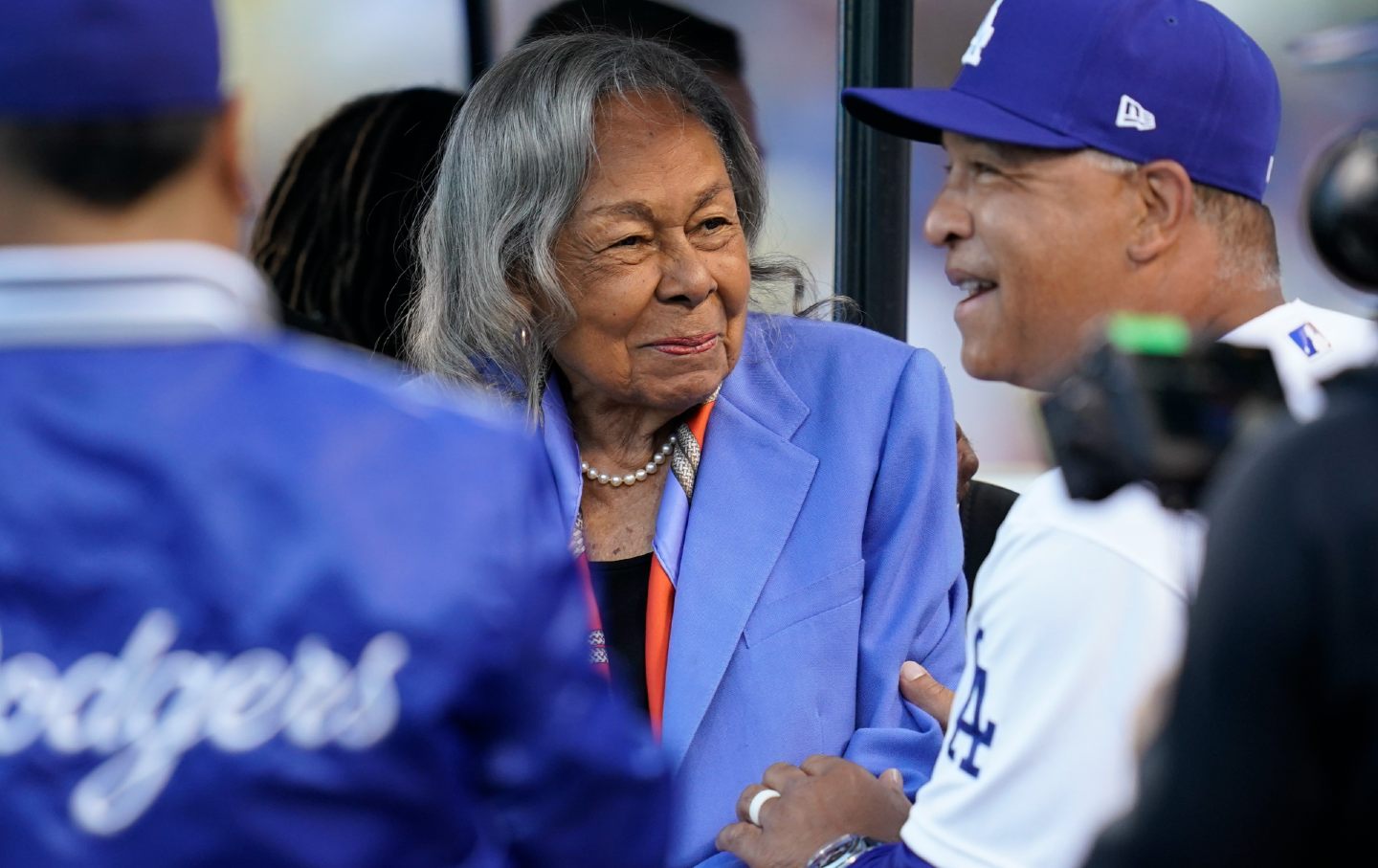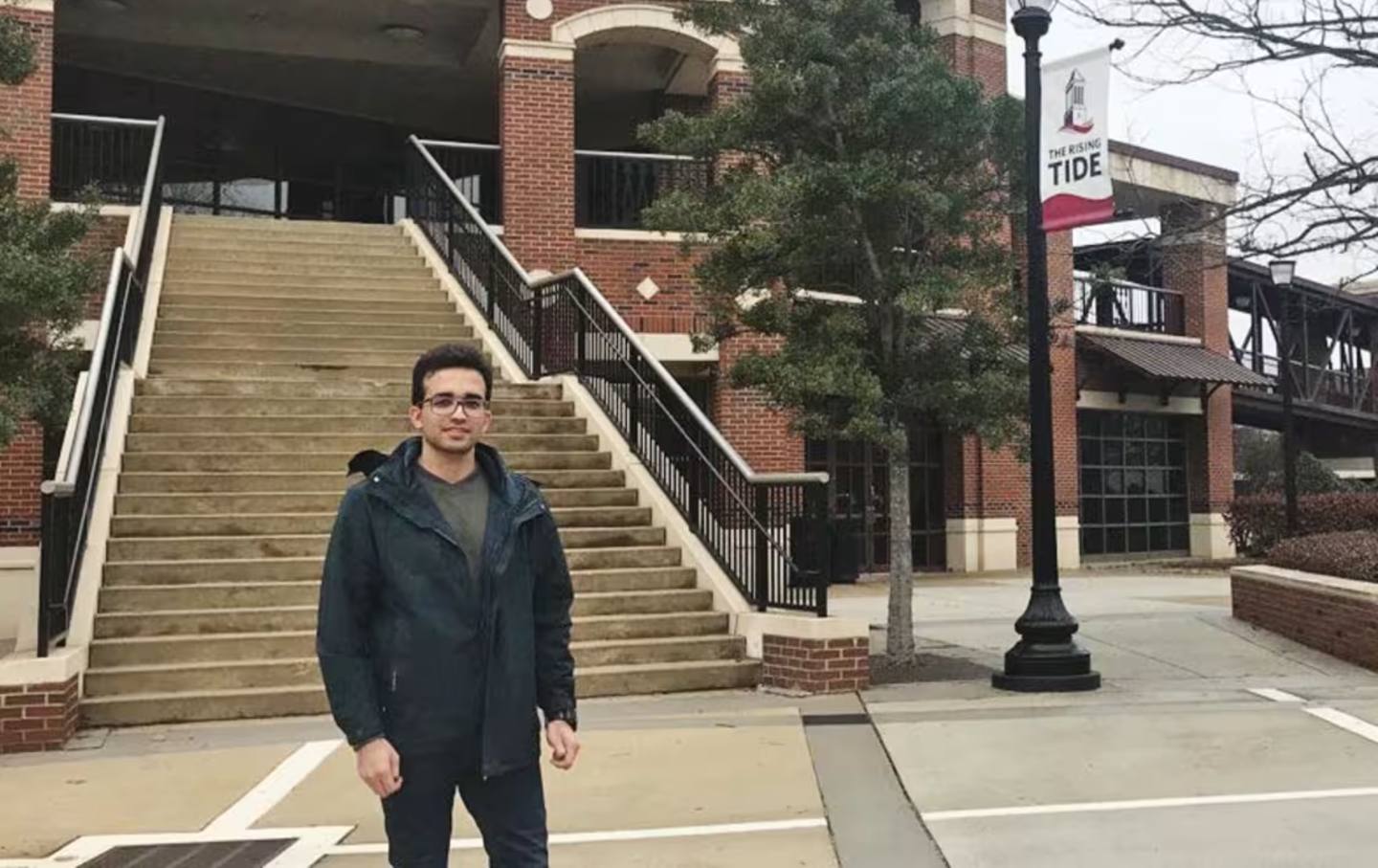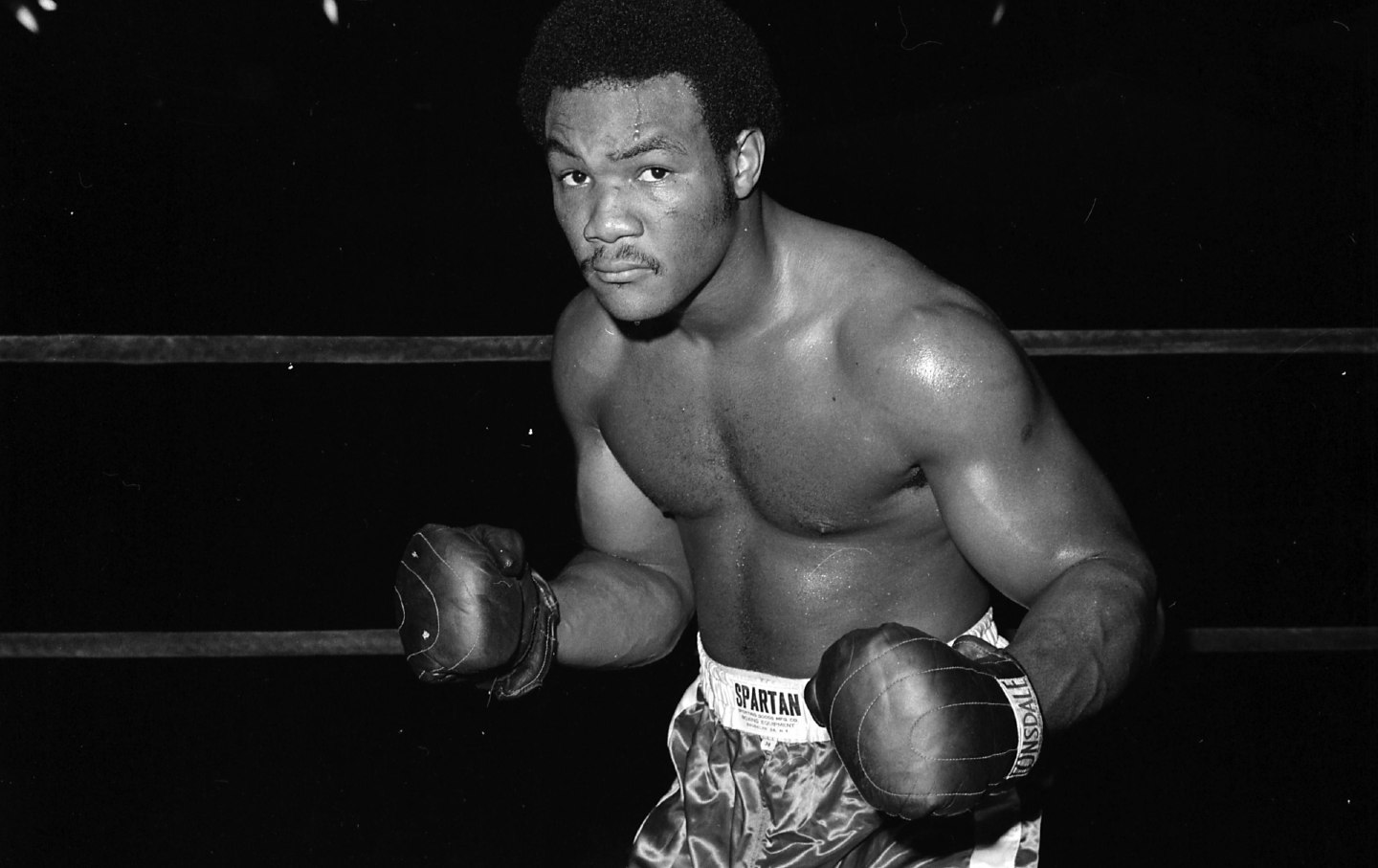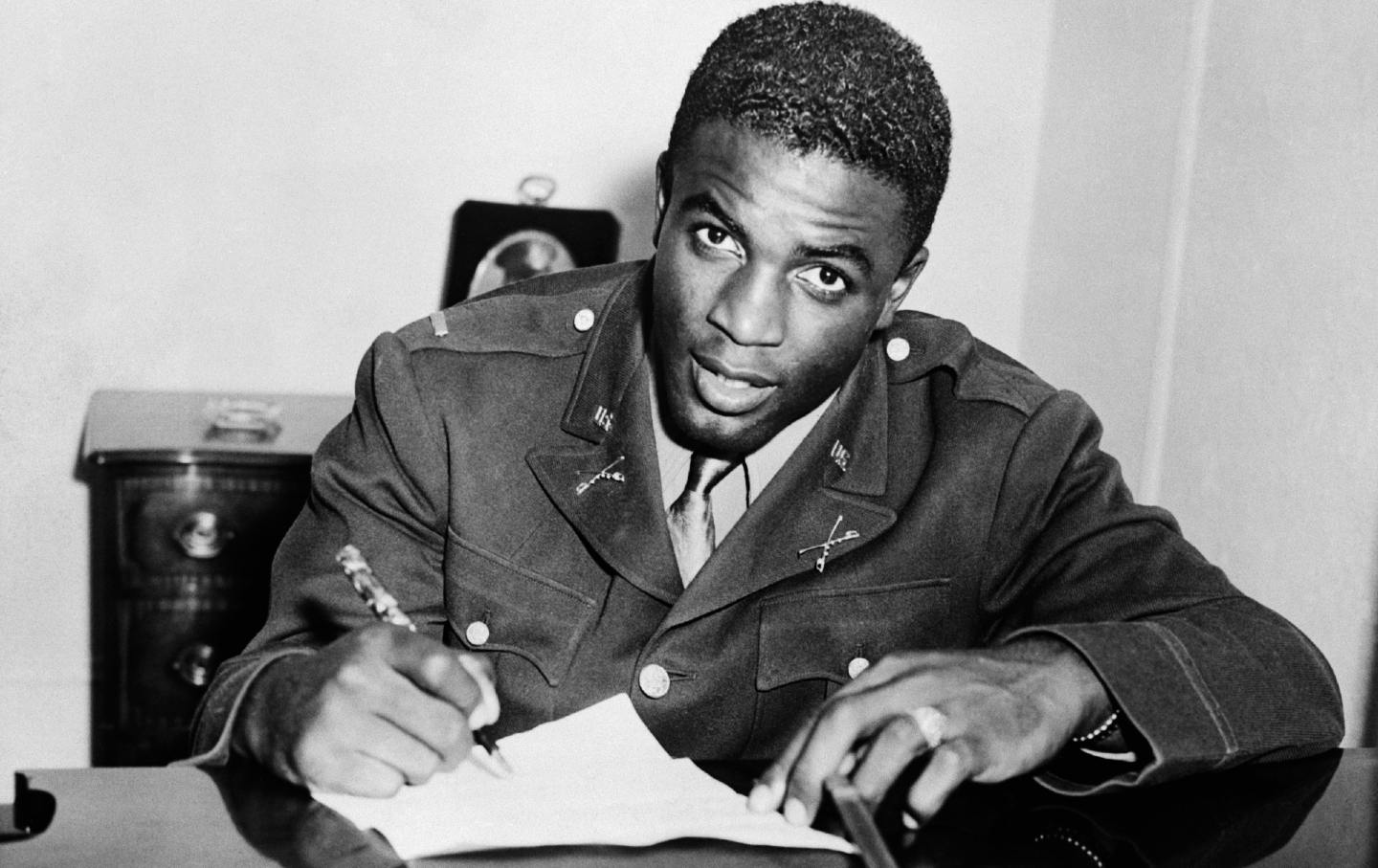The Dark Side of the Democratic Party’s Embrace of Football
The hypermasculinity and violence of football connects to Kamala Harris’s bellicose convention speech. It could repel young voters.
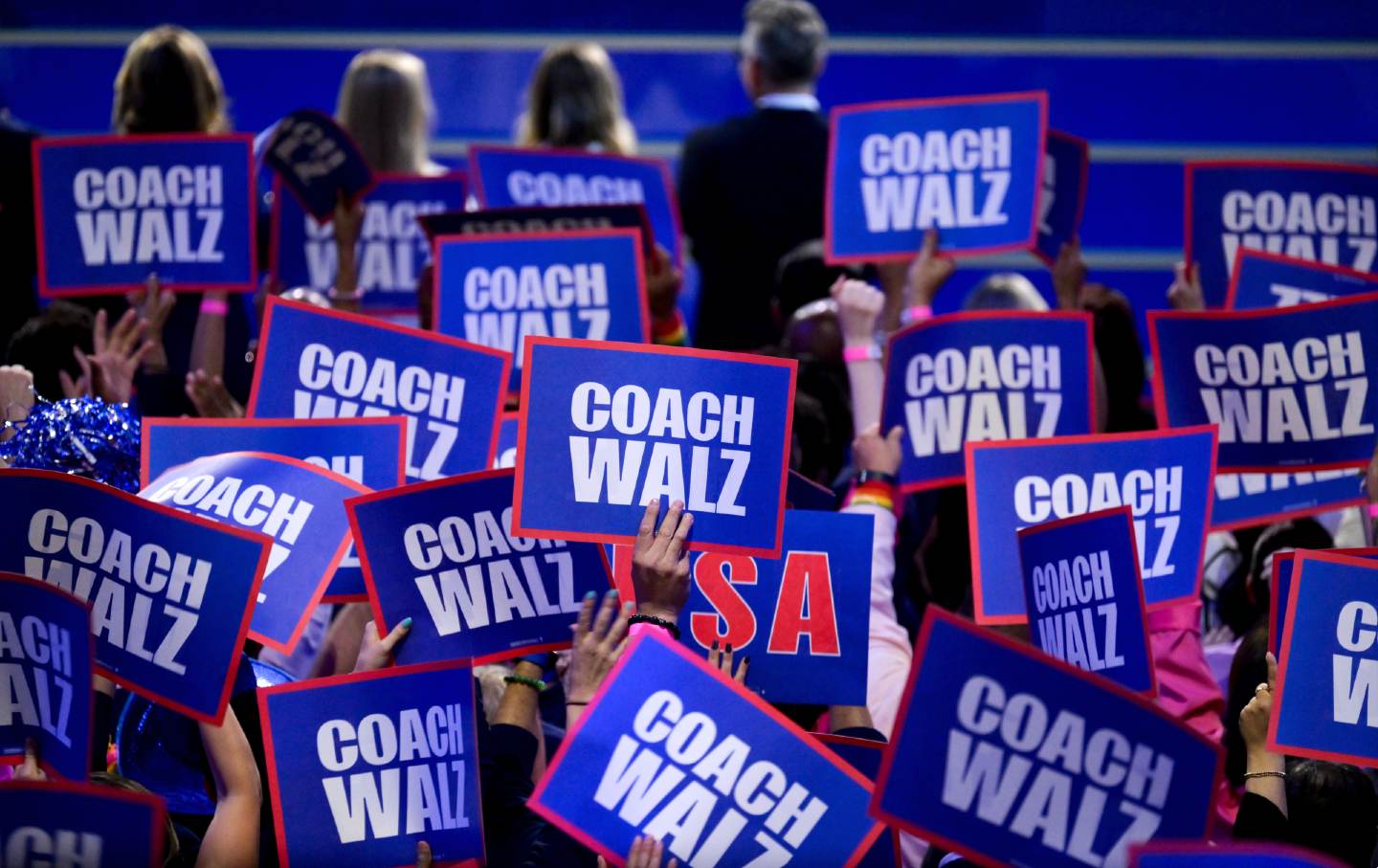
Delegates hold “Coach Walz” signs during the Democratic National Convention at the United Center in Chicago on August 21, 2024.
(David Paul Morris / Bloomberg via Getty Images)One of the universally accepted truths of right-wing media is that the left is coordinating a “war on football.” As neurological data emerged about the long-term effects of football-related concussions over the last decade, the right saw this science as part of a ruse: a conspiracy to soften the game, weaken the American male, and contribute to the “wussification” of the country. In 2016, when the NFL adopted rules to make the game safer by guarding against head injuries, Donald Trump said, “What used to be considered a great tackle—a violent, head-on-head-violent [tackle]… Now they tackle … Bing! Flag! Football has become soft like our country has become soft.”
In other words, NFL rule changes were just another facet of the scheme to socially castrate the American male. (That a large percentage of these men—like Trump—never actually played football or paid its physical costs has been left unspoken.) When issues like violence against women or locker-room bullying—and how the league was hiding it all—became national stories, the right bellowed that this was another anti-male attack from the beta men and feminazis. When President Barack Obama said in 2014 that if he had a son, he would encourage him not to play football, it was like receiving final confirmation of a secret, nefarious master plan to rival the “Great Replacement theory.”
This was their sport, the right’s loudest hucksters howled. It wasn’t just a game but a way of life—a rugged political tradition under attack, a politics as old as the game itself, exemplified when Teddy Roosevelt wrote,”In life, as in a football game, the principle to follow is: Hit the line hard.” The mythic coaches with last names like Rockne, Halas, and Lombardi epitomized to the faithful a rock-ribbed conservatism: hostile to social change, comfortable with violence, and guarding the development not only of players but American masculinity itself. Even with decades of social change, the century-old political mystique assigned to “the football coach” has endured.
How confused, how utterly rattled, these conservatives must be at the moment. Democrats are claiming football for themselves; presenting the sport as not only patriotic but as a potent symbol of the kind of teamwork needed to take down Donald Trump. The presence on the ticket of Minnesota Governor Tim Walz, a former defensive coordinator—as we were repeatedly reminded at the DNC—of the state champions at Mankato East High School, has flipped the pigskin script. Thousands of signs that read “Coach” and chants of the same flooded the DNC when he took the microphone. Former players of Walz—a collection of burly, middle-aged Minnesotans—even came onto the stage alongside him wearing their old jerseys.
Trump and his weaselly running mate, JD Vance, have been recast as football know-nothings—forced to lob awkward insults like, “Walz wasn’t even a coach! He was an assistant coach!” (God help you, if you tell an assistant football coach that they shouldn’t be called “coach.”) It comes off as more than just flat and churlish: It shows that Trump and Vance have never really played the game and are therefore “soft” themselves. The DNC also had Texas senatorial candidate Colin Allred speak: the former NFL player who polls show is closing in on Ted Cruz, an Ivy Leaguer with a reputation for tough talk and cowardly actions (Cancún?). Liberals have been relishing the sight of their opponents—the party of Teddy Roosevelt, the party of football—now playing the role of the weakling (bone spurs?). But for those liberals loving this turnabout, there is a dark side to this.
The platforming of football as a patriotic totem cannot be separated from the sport’s embrace of hypermasculinity and violence. These two pernicious parts of the game connected smoothly with the themes in Harris’s red-meat convention speech: nationalism and a shift to the right alongside a bellicose declaration of war-readiness—having the most “lethal fighting force.” This message was set to chants of “USA,” warming the heart of even Meghan McCain.
The next day’s HuffPost went with the headline, “How Kamala Harris Made Patriotism Fun For Liberals.” Football and the “Coach Walz” persona is now part of the Democratic Party’s campaign of patriotic consensus, a way to project Donald Trump as a far-right reactionary cult leader.
It may seem like the Democrats are playing offense. That certainly fits a sports cliché, but it gets the underlying political dynamic backward. The reclamation of patriotic symbology—of which football is a part—is pulling the Democratic Party to the right. While the left never had a coordinated plan to sink pro football, the last decade’s exposure of the sport’s corrosive nature is a good thing. People have the right to know the negative physical and psychological effects that can arise from playing the most popular sport in the country. Football and medical whistleblowers have exposed a right wing willing to look away from public health if it means pats on the back and campaign dollars from the reactionary billionaires that run the NFL.
Claiming this sport and the NFL means claiming all the violent detritus that comes with it. When Colin Kaepernick took a knee in protest of police violence and racial inequity in 2016, he was banished from the league; a reminder to all players that any kinds of resistance politics would not be tolerated. This is what the Democratic Party is buying into—and it comes with risks. Democratic Party leaders clearly believe that the left is sewn up, and they are therefore free to roam the political wilderness for votes on the right. They’ll use football as a way to get their message out—there are already plans for Walz to attend Friday night football games around the country—but embracing this sport could send the campaign lurching even further to the right.
This rightward shift could repel the young, left-wing voters more interested in policy changes than who wins the football wars. Young people care about racism, the economy, climate change, Palestine, and a host of other issues given short shrift at the convention. Football not only won’t be enough to satisfy them. Its embrace may send a signal that the big tent isn’t big enough for them. This championing of conservative symbols like football, in other words, could cost Harris and Walz the election, and it will be their own doing.
Hold the powerful to account by supporting The Nation
The chaos and cruelty of the Trump administration reaches new lows each week.
Trump’s catastrophic “Liberation Day” has wreaked havoc on the world economy and set up yet another constitutional crisis at home. Plainclothes officers continue to abduct university students off the streets. So-called “enemy aliens” are flown abroad to a mega prison against the orders of the courts. And Signalgate promises to be the first of many incompetence scandals that expose the brutal violence at the core of the American empire.
At a time when elite universities, powerful law firms, and influential media outlets are capitulating to Trump’s intimidation, The Nation is more determined than ever before to hold the powerful to account.
In just the last month, we’ve published reporting on how Trump outsources his mass deportation agenda to other countries, exposed the administration’s appeal to obscure laws to carry out its repressive agenda, and amplified the voices of brave student activists targeted by universities.
We also continue to tell the stories of those who fight back against Trump and Musk, whether on the streets in growing protest movements, in town halls across the country, or in critical state elections—like Wisconsin’s recent state Supreme Court race—that provide a model for resisting Trumpism and prove that Musk can’t buy our democracy.
This is the journalism that matters in 2025. But we can’t do this without you. As a reader-supported publication, we rely on the support of generous donors. Please, help make our essential independent journalism possible with a donation today.
In solidarity,
The Editors
The Nation

